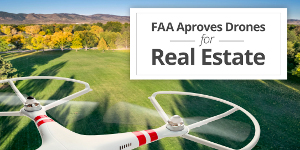You are viewing our site as an Agent, Switch Your View:
Agent | Broker Reset Filters to Default Back to ListFAA Finally Approves Drones for Real Estate: Will it be Worth Your Time?
February 10 2015
 Drones have stirred up quite a buzz in the real estate marketing world, but there have been a lot of unanswered questions regarding how they can be used. That is until recently, when the Federal Aviation Administration (FAA) released a twenty-six-page docket that grants REALTORS® the right to use drones on a case-by-case basis.
Drones have stirred up quite a buzz in the real estate marketing world, but there have been a lot of unanswered questions regarding how they can be used. That is until recently, when the Federal Aviation Administration (FAA) released a twenty-six-page docket that grants REALTORS® the right to use drones on a case-by-case basis.
In order to legally use one of these unmanned aircraft systems (UAS) for commercial purposes, you must have the expressed permission of the FAA. As of January 2015, only 12 out of the 214 commercial entities that have applied for one of these exemptions have been approved.
What does the FAA consider commercial use? According to knowbeforeyoufly.org, a website dedicated to providing consumers with insight on drone usage, there are three main categories that make up commercial use:
- Selling photos or videos taken from a UAS,
- Using a UAS to provide contract services and
- Using a UAS to provide professional services.
Plan on using one of these unmanned aircrafts for you business in the near future? Then it's important that you read through this document in its entirety to keep yourself from landing in hot water with the FAA. You'll notice that the docket is filled with legal jargon, so here are four tips that will help you decide if taking the time to figure out what it all means will be worth your while.
Not all pilots are created equally
If you want to legally fly a drone to promote your business, there will be a lot of hoops to jump through. For starters, anyone using one of these unmanned aircraft for commercial purposes will be required to obtain a private pilot's license (yes, the same license required to fly a real plane). But let's be honest, obtaining one of these licenses isn't as simple as going to the DMV, and will require a serious amount of time and resources.
The only way around this obstacle is to receive an exemption from the FAA, and considering their strict regulations, it comes as no surprise that such a limited amount of REALTORS® are able to take to the sky. On top of all of that, you'll need to obtain an FAA Certificate of Authorization (COA) before you can put your aircraft in action.
This may seem like a lot of work just to fly a drone, but the benefits of being able to capture spectacular views of your listings and communities are endless. Not only will buyers and sellers see that you're at the forefront of real estate technology, but you'll also be a step ahead of the competition when this technology becomes more accessible to the public. Visit the FAA's website and take a look at the "Section 333" page for more information on the requirements for piloting your drone.
Standard Operating Procedures
If you're one of the individuals to be granted permission to pilot your drone for the purpose of promoting a listing or community, there are some strict operating guidelines that must be followed. Here are just a few of the ones outlined in the FAA's recent docket:
- UAS must be operated below 300 feet and within a radius of 100 feet from the controller.
- UAS must always remain within direct line of sight of the operator.
- Contact respective airports if operations will be within 5 miles to advise them of the estimated flight time, duration, elevation and other pertinent information.
- UAS must not be operated over heavily congested areas.
These are just a few of the many regulations, so be sure that you read through the entire document to get all the information.
Have your pen and paper handy
The paperwork involved in getting the "green light" from the FAA to fly is just the beginning. There will also be a mountain of ongoing paperwork for documenting your flight activity and to ensure that your drone stays in proper working condition. Things like description of work being performed and records of maintenance are just two examples of what the FAA will be looking for. The strict regulations of the FAA has allowed the U.S. to establish one of the safest airspaces in the world. In order to maintain this level of safety, it is important that they apply the same level of restrictions to the world of drones.
Getting to know your drone and other equipment
You must be able to provide all the specifications of your aircraft to meet the FAA's regulations. Details such as weight, number of props and power source are just a few of things that you will need to submit with your application in order to be considered for the opportunity to pilot your own aircraft. Furthermore, you'll need to provide information on the camera and any other attachments that you will be using to make your real estate video. These specifications will allow the FAA to determine whether or not your equipment meets their standard safety requirements.
Although there is a laundry list of things that need to be done before you are legally able to fly, the benefits of using video to market your properties and communities will continue to expand, and those who remain on the cutting edge are likely to reap many rewards.
Keep an eye out for the next article regarding drones to learn the best ways you can use them to market your business!
To view the original article, visit the Homes.com blog.









